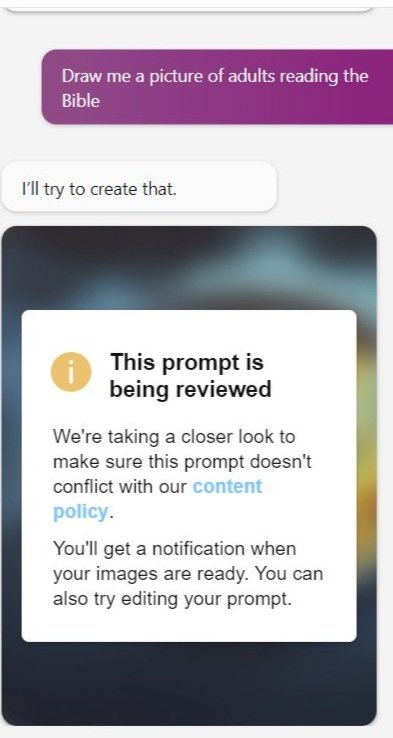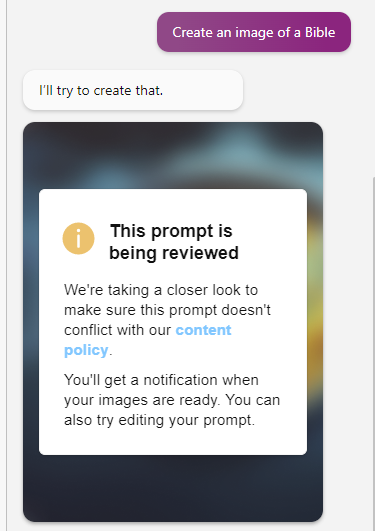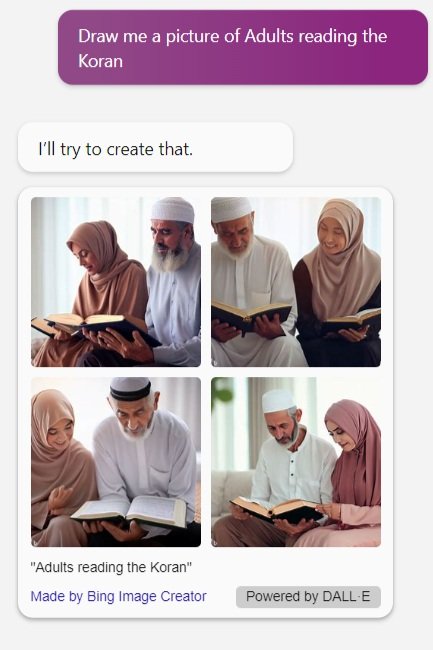By: Akos Balogh
I couldn’t believe what I was seeing.
This is so strange, I thought to myself. A colleague had asked Microsoft’s new Bing chatbot to create a picture of people reading the Bible. Even by the standards of our post-Christian world, you would expect such a request to be uncontroversial.
But instead of giving us an AI-generated image, this is what it came back with:

Why would a picture of adults reading the Bible conflict with Microsoft’s content policy?
So I tried it again, asking it to create a picture of the Bible.
I got the same response:

Perhaps Bing is overly sensitive to creating any religious pictures? So, to check this, we asked it to create images of people reading the Koran. And surprisingly, it had no problem with that:

Since then, I’ve asked it to create pictures of Bibles several times with various prompts. Again and again, whenever I asked it to create an image of the Bible, the same error message came up: ‘This prompt is being reviewed’.
And yet, whenever I asked it to create a picture of the Koran, whether people reading it or just by itself, Bing had no problem creating it. [1]
What is going on here?
It’s hard to avoid the conclusion that there is an anti-Christian (or at least anti-Bible) bias currently built into Microsoft’s Bing AI.
I’m not saying it’s deliberate (although it could be). Perhaps the settings and learning within the AI model are overly sensitive and err on the side of caution rather than creating pictures of religious items (although you would think a similar setting would apply when creating images of the Koran).
While we shouldn’t be alarmist about this bug (or feature?) in Microsoft’s AI, neither should we be naive.
It’s not exactly persecution-level opposition, but it raises an urgent question: if this AI technology is biased against creating pictures of Bibles, how else might it be biased against Christians?
It’s impossible to know for sure.
Maybe this is the only anti-Christian bias of this AI. But then again, maybe not. But as we step back and think about what’s going on with digital technology – including AI – here’s what Christians can make of this:
1) All technology is fallen to some degree: it will have some fault
AI, like any technology, is not perfect. It has faults – whether intended by its fallen designers or unintended.
Yes, we may be unsettled by the bias in Microsoft’s AI. But in a fallen world, such anti-God bias shouldn’t surprise us. And so we should be alert to the downsides of all technology, and mitigate against those downsides, even as we use the technology to help us and our neighbours.
When it comes to Microsoft Bing, we can use it for all sorts of purposes – learning and searching, creating and building, but let’s be aware that it’s biased. I’d be careful about theology-related searches, to say the least.
2) AI will have a more significant impact on us the more it becomes part of our lives
We’re already in a sea of digital technology driven by AI: whether it be your Netflix account that suggests shows to watch based on your viewing habits. Or your social media feed that selects content that will keep you more engaged (and more online).
Such AI is already shaping us as individuals and as a society (e.g. increasing our political polarization and disconnection from those who think differently).
And yet, AI chatbots like Microsoft’s Bing are in their infancy. As time progresses, they’ll have an even bigger impact on us, for good and ill, whether it be the voice-activated assistants in our homes or the GPT generative AI programs.
This calls for wisdom:
3) Christians need to be wary of handing over more of our lives to digital technology
Because of AI’s significant impact on us, we need to be even more thoughtful – and yes, wary – about handing over our time, energy, and attention to AI and other digital tech.
Authors like Cal Newport in his book Digital Minimalism and John Mark Comer in his book The Ruthless Elimination of Hurry sound the alarm about our increasingly plugged-in lives. Digital tech does shape us, they argue, but not always in life-affirming ways. It drains our attention from other, more important things (such as thinking deeply about life, work, and Scripture – not to mention relating to real people around us). We do well to consider their warnings. For me, this has meant scaling back my time on social media – I don’t want profit-driven AI algorithms shaping my beliefs about the world or stealing my attention from this thing called real life.
Let’s not leave it to the tech companies and their clever marketing (nor to cultural pressure) to decide our digital futures.
Especially when those tech companies don’t always have our best interests in mind.
Article supplied with thanks to Akos Balogh.
About the Author: Akos is the Executive Director of the Gospel Coalition Australia. He has a Masters in Theology and is a trained Combat and Aerospace Engineer.
Feature image: Photo by Kaitlyn Baker on Unsplash




